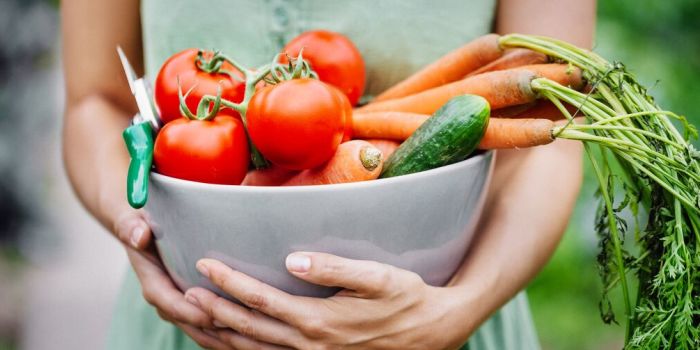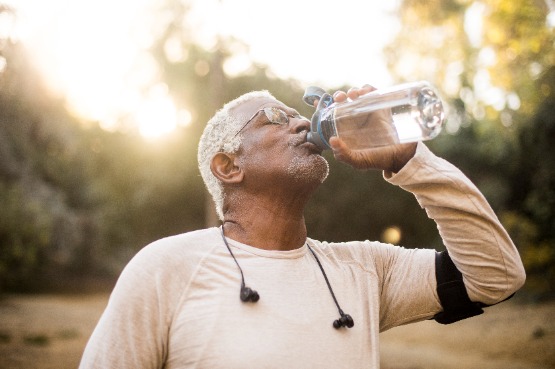Can you reduce menopause symptoms through your diet?
If you’re experiencing the menopause, you might be wondering if there are any foods you can include, or avoid, to help your symptoms. Here, I’ll explain some ways to make sure your diet is helping you to have a healthy menopause.

What is the link between diet and menopause?
Your diet can impact many areas of your health and wellbeing. When it comes to the menopause – what you eat can affect your symptoms during this time, as well as your post menopause health risks.
A balanced and healthy diet may be able to reduce symptoms such as hot flushes, as well as help you with menopause associated weight gain. Over the longer term, a healthy diet can reduce your risk of cardiovascular disease and osteoporosis, both of which are more likely post menopause.
Why do women gain weight during the menopause?
Gaining weight is quite common around the time of the menopause. This is because as you age you tend to lose some muscle.
The more muscle we have, the more calories we burn, even when we aren’t doing anything active. This means that if the amount of muscle you have decreases, you need to eat fewer calories. But it can be easy to eat more than you need to achieve or maintain a healthy weight.
How can I manage my weight during the menopause?
You might find it helpful to be mindful of your portion sizes, and make sure you’re eating a healthy balanced diet. Below are some tips for healthy eating.
- Eat at least five portions of fruit and vegetables a day. Fresh, tinned, and dried all count.
- Include healthy, wholegrain starchy foods in every meal, such as wholemeal bread or brown rice.
- Eat moderate amounts of protein such as beans, lentils, chicken, fish, and meat. Avoid processed meats such as bacon and sausages as much as possible.
- Include some calcium-rich foods every day.
- Swap saturated fats, such as those found in butter and meat, for unsaturated fats, such as those found in oily fish, nuts and olive oil.
- Cut down on foods high in salt and sugar, such as crisps and chocolate.
- Keep hydrated by drinking plenty throughout the day. If you don’t like water, you could try sugar free squash or herbal tea.
Regular exercise will also help you to manage your weight. Find something that you enjoy and try to build it into your routine. Aim for at least 150 minutes of moderate activity each week. This can include cycling or brisk walking, or 75 minutes of vigorous intensity, such as running or playing sport.
Try to include two sessions of strength-building exercises a week as well. Strengthening exercises involve moving your muscles against some resistance. Lifting weights, using resistance bands or doing exercises such as push-ups or squats all count.
Eating healthily and exercising regularly will also help keep your heart healthy. This is important because after the menopause you can be at increased risk of heart disease.
Can my diet help with hot flushes?
Many people experience hot flushes as a symptom of the menopause. There isn’t lots of evidence that certain foods or drinks trigger hot flushes, but some people find avoiding certain things helpful, such as:
- spicy foods
- alcohol
- caffeine
This won’t work for everybody, so it’s best to try and see what works for you. You might find it useful to track your symptoms, as well as what you eat and drink, to see if there are any patterns.
Alcohol and the menopause
It can be tempting to unwind with a glass of wine but alcohol is likely to worsen menopausal symptoms. Unfortunately, whilst alcohol can help you to relax initially, it can interfere with your sleep quality later on.
As good sleep can reduce menopausal symptoms such as anxiety so it’s best to keep your alcohol intake to a minimum. Alcohol can also worsen hot flush severity and may aggravate other symptoms such as palpitations and mood swings.
There is also a link between alcohol intake and breast cancer, so keeping under the recommended intake of 14 units per week is a good idea.
Should I be eating phyto-oestrogens?
You might have heard some people talk about phyto-oestrogens. These are compounds found naturally in some plants that are similar to human oestrogens. It’s thought that eating these foods might be helpful for some menopause symptoms, but the evidence about whether they work is mixed.
Phyto-oestrogens are found in many different foods, including:
- soya products such as tofu or soya milk
- linseeds
- chickpeas
- lentils
- fruits and vegetables
It appears that regularly having portions of these foods throughout the day works better than having lots of them all at once. You could try adding linseeds to your breakfast cereal or having a soya yoghurt as a dessert.
It’s worth noting that it might take a few months to see any results, and that these foods won’t affect everybody’s symptoms.
How to keep your bones strong and healthy
Some effects of the menopause are less obvious because they happen inside your body. This includes the way that the menopause impacts your bones. As a result of low oestrogen levels, the menopause can negatively affect your bone density. This can mean you are more likely to develop osteoporosis.
Here are some things that you can do to help keep your bones healthy.
- Include muscle-strengthening exercises into your exercise routine.
- Eat plenty foods rich in calcium.
- Make sure you’re getting enough vitamin D.
Calcium
Calcium helps to keep your bones strong and healthy. You should aim for two or three portions of calcium-rich foods every day. A portion can be:
- 200ml (a third of a pint) semi-skimmed milk
- 30g piece of cheese (about the size of a small matchbox), or
- 3tbsp of yoghurt (a small pot)
If you don’t eat dairy, you can also get calcium from dairy alternatives, such as those made from soya or oats. But you should check that calcium has been added to these products, as they do not usually contain enough calcium otherwise. The Royal Osteoporosis society has a useful list to help you calculate the calcium in your diet.
Vitamin D
Vitamin D helps your bones absorb the calcium they need. It’s made under your skin when you go outside in daylight during the summer months. You can’t get enough vitamin D from your diet, but there are foods that do have small amounts, such as:
- oily fish such as salmon or pilchards
- fortified foods, such as some breakfast cereals
- egg yolks
Everyone living in the UK is advised to take vitamin D supplements between October and March as there isn’t sufficient sunlight during these months.
While the menopause can affect everyone differently, it’s always worthwhile eating a balanced and healthy diet. This may help to reduce some of your symptoms and will also improve your general health.
If you’re experiencing menopause symptoms, you don’t have to face them alone. With a Bupa Menopause Plan, you can discuss symptoms with a specially trained GP, get a personalised care plan based around your needs with access to 24/7 support via Anytime HealthLine.
-
Sources Sources
- UK Chief Medical Officers' Physical Activity Guidelines. Page 10. Department of Health and Social Care.gov.uk, accessed 22 September 2023
- Exercise for bones. Royal Osteoporosis Society. theors.org.uk, accessed 22 September 2023
- Why does the menopause affect your heart? Menopause and heart disease. British Heart Foundation.bhf.org.uk accessed 22 September 2023
- Hot Flushes. Patient. patient.info, updated May 2022
- Phyto-oestrogens. Patient. patient.info, updated May 2022
- Menopause. British Nutrition Foundation.nutrition.org.uk accessed 22 September 2023
- Menopause and diet: Food Fact Sheet. British Dietetic Association.bda.uk.com, published May 2019
- Menopause and its Management. Patient.patient.info, updated 29 Jan 2020
- Calcium. Royal Osteoporosis Society.theors.org.uk, accessed 22 September 2023
- Portion sizes: Food Fact Sheet. British Dietetic Association .bda.uk.com, accessed 22 September 2023.Vitamin D: supplement use in specific population groups. Public health guideline [PH56]. National Institute for Health and Care Excellence.nice.org.uk, accessed 22 September 2023
About our health information
At Bupa we produce a wealth of free health information for you and your family. This is because we believe that trustworthy information is essential in helping you make better decisions about your health and wellbeing.
Our information has been awarded the PIF TICK for trustworthy health information. It also follows the principles of the The Information Standard.

More diet and nutrition articles
Did you find our advice helpful?
We’d love to hear what you think. Our short survey takes just a few minutes to complete and helps us to keep improving our healthy lifestyle articles.
Legal disclaimer
This information was published by Bupa's Health Content Team and is based on reputable sources of medical evidence. It has been reviewed by appropriate medical or clinical professionals and deemed accurate on the date of review. Photos are only for illustrative purposes and do not reflect every presentation of a condition.
Any information about a treatment or procedure is generic, and does not necessarily describe that treatment or procedure as delivered by Bupa or its associated providers.
The information contained on this page and in any third party websites referred to on this page is not intended nor implied to be a substitute for professional medical advice nor is it intended to be for medical diagnosis or treatment. Third party websites are not owned or controlled by Bupa and any individual may be able to access and post messages on them. Bupa is not responsible for the content or availability of these third party websites. We do not accept advertising on this page.







